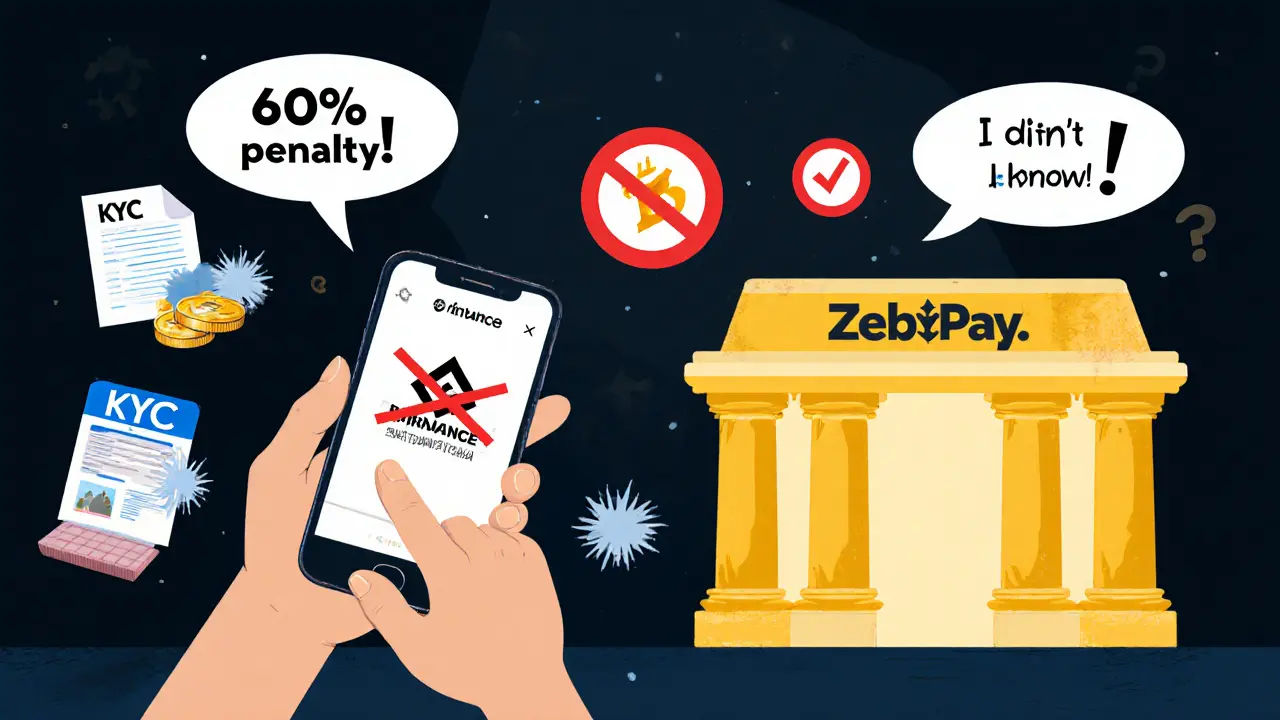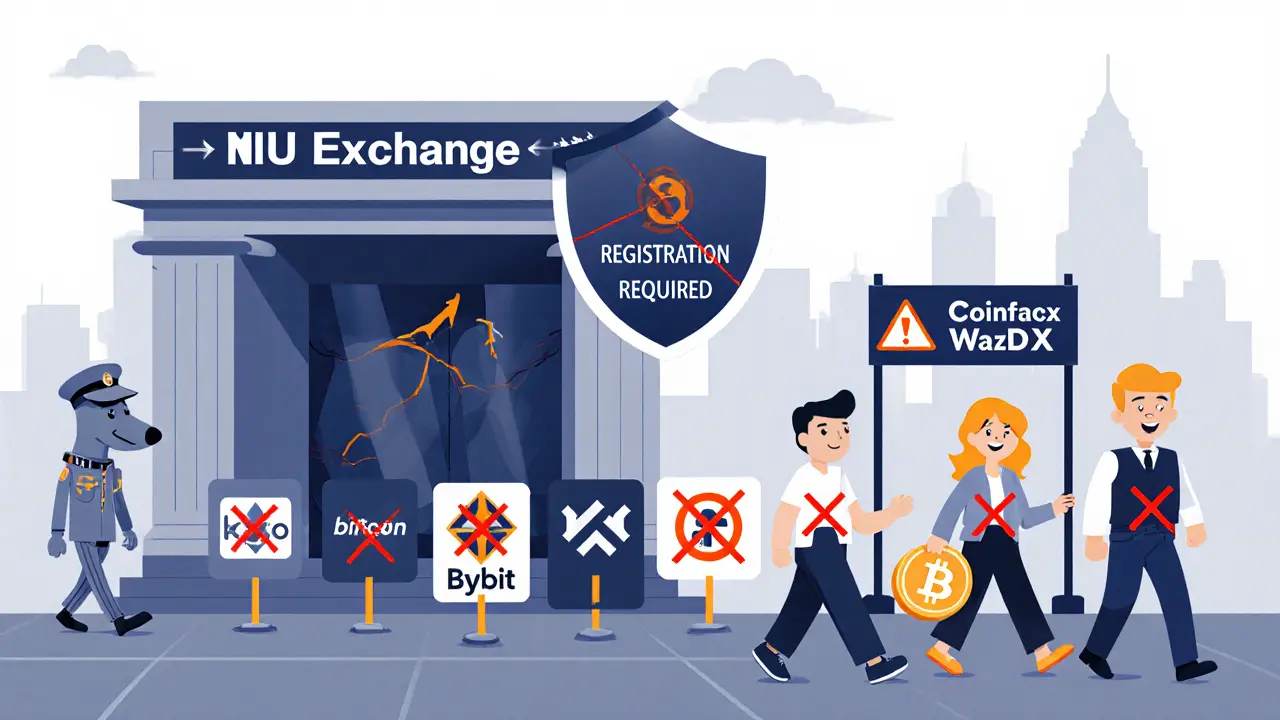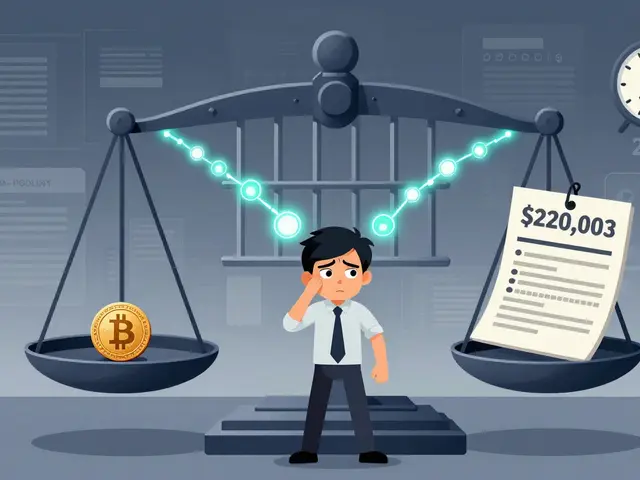Crypto Exchange Compliance Checker
Is Your Exchange Legal in India?
Check if a crypto exchange is registered with FIU-IND and compliant with Indian regulations.
Note: This tool verifies exchange registration status only. It does not replace professional financial advice.
Enter an exchange name to check its compliance status in India
India hasn’t banned cryptocurrency - but it has banned crypto exchanges that refuse to play by its rules. If you’re trying to trade crypto in India and can’t access your favorite platform, it’s not a glitch. It’s the government stepping in. Since early 2024, dozens of international crypto exchanges have been blocked from serving Indian users. Why? Because they didn’t register with India’s financial watchdog. And if you’re still using one of those platforms, you’re risking your money - and your tax compliance.
What Exactly Got Banned?
The Financial Intelligence Unit-India (FIU-IND) is the agency in charge of tracking suspicious financial activity. In late 2023 and early 2024, it started demanding that every crypto exchange serving Indian customers register with them. No registration? No access. That’s it. Exchanges that failed to comply were blocked at the network level. Their websites stopped loading. Their apps vanished from Indian app stores. Bank transfers to them were frozen. Users couldn’t deposit INR. Withdrawals got stuck. And worst of all - users had no official way to complain. The banned list includes major global names:- Binance
- KuCoin
- Bybit
- OKX
- Gate.io
- Huobi
- Bitfinex
- Bitstamp
- Coinbase (partially restricted)
Why Did This Happen?
It’s not about banning crypto. It’s about control. Before 2024, Indian users were trading on offshore platforms that didn’t report anything to Indian tax authorities. No transaction logs. No KYC. No tax reports. People were making profits - and hiding them. The government lost out on billions in potential tax revenue. The FIU-IND stepped in because these platforms were seen as high-risk for money laundering. No local presence. No accountability. No audit trail. That’s a red flag for any financial regulator. The turning point came with the Finance Bill 2025, which added Section 285BAA. This law says: Any exchange that registers with FIU-IND must keep full records of every trade - even those made before registration. That means if Binance registers tomorrow, they’ll have to hand over every trade you made since 2018. No more hiding.Which Exchanges Are Still Legal in India?
Only the ones that registered with FIU-IND. These platforms now operate legally, report to tax authorities, and can accept INR deposits. They’re your only safe option. Here are the FIU-registered exchanges you can use right now:- CoinDCX
- WazirX
- ZebPay
- Unocoin
- Mudrex
- CoinSwitch Kuber
- BuyUcoin
- Store user data for at least 6 years
- Submit monthly transaction reports to FIU-IND
- Verify every user’s identity (KYC)
- Provide tax-ready trade summaries
- Have a clear grievance redressal process

What Happens If You Use a Banned Exchange?
You might think: “I’ve been using Binance for years. It still works on my phone.” But here’s the catch - it’s not working legally. If you’re trading on a banned platform:- Your INR deposits might get reversed by your bank
- You won’t get tax reports - so you’re on your own to calculate gains
- If your account gets hacked or frozen, you have no legal recourse
- You’re at risk of being flagged by the Enforcement Directorate (ED) for unreported crypto income
- You could face a 60% penalty if the tax department audits you and finds undeclared gains
Why Did Indian Exchanges Boom?
When Binance and KuCoin got blocked, millions of Indian users had nowhere to go. The result? A mass migration. CoinDCX saw deposits jump over 2,000% in just a few months. Mudrex added 10,000 new users in three weeks. WazirX and CoinSwitch offered cash bonuses just to get people to move their assets. It wasn’t because these Indian platforms were better. It was because they were the only ones left standing. Today, over 85% of crypto trading volume in India flows through FIU-registered exchanges. Global platforms are watching closely. Some, like Binance, have reportedly paid millions in penalties to Indian authorities in hopes of getting back in. But until they fully comply - no access.
What About Decentralized Exchanges (DEXs)?
You might think: “I’ll just use Uniswap or PancakeSwap. They’re decentralized. They can’t be blocked.” Technically, yes. But here’s the problem: you still need to convert INR to crypto to use them. And that’s where you hit the wall. Indian banks won’t process payments to DEXs. Payment gateways like Razorpay and PayU won’t support them. You can’t deposit INR directly into a DEX. You’d need to buy crypto on a banned exchange first - which puts you right back in the same legal gray zone. Plus, DEXs don’t provide tax reports. You’re still responsible for tracking every swap, every liquidity pool deposit, every token transfer. That’s impossible for most people. And if the tax department comes knocking, you’ll have no proof you didn’t evade taxes.What’s Next for Crypto in India?
The government isn’t trying to kill crypto. It’s trying to bring it into the formal economy. The next step? A possible crypto regulatory sandbox. A pilot program where exchanges can test new products under supervision. Or maybe a licensing system similar to how banks operate. But for now, the rules are clear: register with FIU-IND or get blocked. International exchanges still have a path back - if they’re willing to give up their anonymity, submit to audits, and hand over years of user data. Most haven’t taken it yet. For Indian users, the choice is simple: use a registered exchange and stay compliant - or keep using a banned one and risk losing your money, your tax status, and possibly your legal standing.Are cryptocurrency transactions legal in India?
Yes, buying, selling, and holding cryptocurrency is legal in India. The government has never banned crypto itself. What’s banned are exchanges that don’t register with FIU-IND. As long as you use a registered platform, your trades are legal.
Can I still use Binance in India?
No. Binance’s website and app are blocked in India. You might still access it via a VPN, but your bank will block INR deposits, and you won’t get tax reports. Using Binance now puts your funds and tax compliance at risk. It’s not worth the danger.
Why are Indian exchanges safer than foreign ones?
Indian exchanges registered with FIU-IND must follow strict rules: they keep your KYC data, report your trades to tax authorities, provide tax summaries, and have a customer support system. If something goes wrong, you have legal recourse. Foreign exchanges don’t have to do any of this - so you’re on your own.
Do I have to pay tax on crypto even if I use a registered exchange?
Yes. All crypto gains - whether from registered or banned exchanges - are taxable at 31.2%. But if you use a registered exchange, they’ll give you a tax report that matches what the government already has. That makes filing easy. With banned exchanges, you’re guessing your numbers - which invites penalties.
What happens if I don’t report my crypto gains from a banned exchange?
If the tax department finds out - through bank records, data leaks, or future FIU-IND disclosures - you could face a penalty of up to 60% of the unreported amount, plus interest. You’ll also have to pay the 31.2% tax on top. That’s nearly 92% of your profit gone. It’s cheaper to just report it.
Can I transfer my crypto from a banned exchange to a registered one?
Yes, you can transfer crypto tokens (like BTC or ETH) from a banned exchange to a registered one. But you can’t withdraw INR from the banned platform. Once you move your crypto, you can sell it on a registered exchange and withdraw INR legally. Just make sure you track the original purchase price - you’ll need it for tax calculation.
What Should You Do Now?
If you’re still using a banned exchange:- Stop depositing INR immediately
- Transfer your crypto to a registered exchange like CoinDCX or WazirX
- Calculate your gains from the time you first bought crypto
- File your taxes - even if you used a banned platform
- Never use a VPN to access blocked exchanges again












People Comments
lol why even bother with crypto if you gotta pay 92% in taxes 😂
The government doesn't ban exchanges. It bans chaos. Simple.
They're not banning exchanges. They're banning freedom. Watch how fast they start tracking your crypto like it's a crime to own it.
Honestly, I'm glad we have local platforms now. At least I know who to call if something goes wrong.
India finally doing something right. No more foreign apps taking our money without accountability.
Just transferred my BTC from Binance to CoinDCX. Took 3 hours. Tax calc is a nightmare but at least I'm clean now. Pro tip: save every tx hash.
This is actually a brilliant move. Nigeria should take notes. Financial sovereignty isn't about isolation-it's about responsibility.
Wait, so Coinbase is 'partially restricted'? That's just corporate PR. They're still not registered. Don't be fooled.
This isn't about control-it's about justice. For years, Indian citizens were left in the dark, risking their life savings on platforms that didn't even acknowledge their existence. Now, at least, there's a paper trail. A record. A system. And yes, it's inconvenient. But isn't that better than losing everything silently? You can't build a future on anonymity. You build it on accountability.
yall act like this is a crackdown but its just the government finally sayin 'hey we need to know where the money is' like duh??
People who use VPNs to access banned exchanges are just asking for trouble
You think they blocked Binance because of taxes? Nah. They're scared. They know crypto will make the middle class independent. And that’s the real threat.
If you're still using Binance, you're not a crypto pioneer. You're a liability.
This is textbook authoritarian overreach disguised as financial reform. The government doesn't want to regulate crypto-it wants to monopolize it. Next, they'll force you to use only state-approved wallets and demand biometric verification for every transaction. They're not protecting users; they're creating a surveillance financial state. And the worst part? Most people are cheering because they don't understand what's being surrendered.
Is there any public documentation of the FIU-IND’s registration criteria? I’d like to review the exact compliance standards.
I mean, I get the logic, but it’s just sad that India’s crypto scene now feels like a gated community. The innovation is gone. It’s all compliance now.
bro just move your coins and file your taxes 😎 it’s not that hard. crypto ain’t a get rich quick scheme, it’s a long game. stay smart.
I appreciate how the post laid this out without fear or favor. It’s easy to get emotional about this stuff, but clarity matters more than outrage. Thanks for the facts.
I was scared at first, but now I feel safer using WazirX. At least I know someone’s watching out for me.
I used to hate this stuff, but honestly? I’d rather pay tax than lose my coins to a sketchy exchange that vanishes overnight. This is actually a win.
The real question isn't whether the ban is justified-it's whether the system built in its place can truly serve the people. Regulation without access is still exclusion. Let’s not confuse order with equity.
This is exactly why crypto will never go mainstream in places like India. Too much bureaucracy. Too much fear. Too little innovation. Just a bunch of scared bureaucrats trying to control what they don't understand.